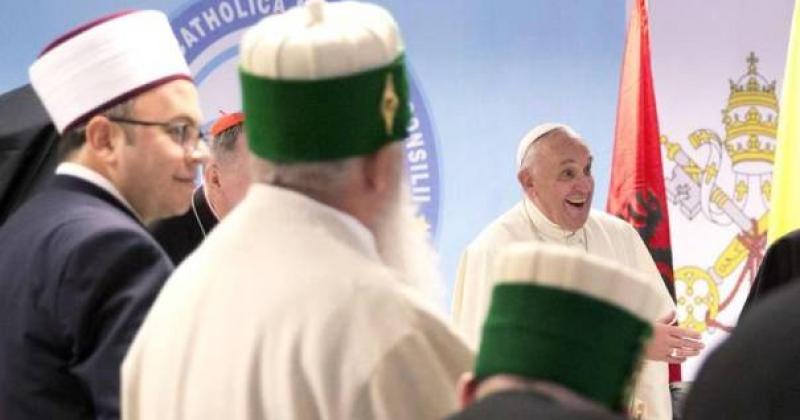When Francis’ express visit to Albania was announced, the crisis in Iraq had not yet worsened and ISIS’ project of destruction had not yet come under the spotlight. Two reasons drove the Pope to accept the invitation to visit “the land of the eagles”: he wanted to encourage peaceful coexistence and collaboration between different Christian religions and the Muslim community and express his support to a country that was recently bathed in the blood of martyrs, under one of the most ferocious communist regimes imaginable.
The events witnessed in the Middle East in the past few weeks have made the Bishop of Rome’s visit to Tirana, which is the capital of a majority Muslim country, all the more significant. Ever since its independence in 1912, Albania wanted both Muslims and Christians (Catholic and Orthodox) among its leaders.
During his visit to Albania the Pope repeated – within today’s context – the words pronounced by Pope John Paul II in Assisi, in October 2001. He denounced the use of God’s name to justify terrorism, violence and discrimination. He called the act of killing and trampling on human dignity in the name of religion, “a great sacrilege”. He did so in a country that had had to overcome great challenges after being crushed by one of history’s worst totalitarian regimes. Now - despite the many difficulties it still faces, for example, the divide between a wealthy minority and a poor majority and the risk of the communist ideology being replaced by a consumerist mindset – Albania is a shining example of peaceful co-existence and brotherhood.
During his meeting with leaders of the five major religious communities in the country, two of them Muslim, , the Pope strayed from his written speech to say a few words about the importance of identity, briefly referring back to some points made during his speech to Asia’s bishops in Korea last August. We must start from who we are, from what we believe in, without pretence and without putting on a façade. But, Francis explained, reciprocal testimony and digging deeper into one’s own identity allows us to “walk together”, thereby taking care of other people’s needs and working towards a common good. More than any theological debate or the manipulation of identity, used as a means of supremacy and sometimes oppression, or even as a flag for “identitarian” battles, in some cases recognising each other as travel companions and focusing on a specific goal is something people already have in common. In other cases it could be something members of different religious communities have in common. Albania is a good example of this spirit of brotherhood. As Francis said during his brief conversation with journalists on the flight from Tirana to Rome, this is why it is not a Muslim country but a “European” country.
Finally, yesterday’s scene in Tirana’s St. Paul Cathedral was also highly important: a visibly moved Pope wept as he listened to the simple, evangelical testimony of a priest who spent 27 years in prison and was subjected to forced labour just for being a priest. In the remarks he made moving away from his prepared speech, words he repeated again during the in-flight interview, Francis showed his appreciation for the simplicity of the priests’ story, which was devoid of any bitter feelings.
Despite the death threats, the torture, the deprivation of freedom and the forced labour he was subjected to, the priest expressed his love for the enemies of which Jesus spoke in the Gospels, with a touching simplicity. This is why Francis repeated what the unique dynamics of the distress and martyrdom experienced by Christians. A martyrdom which does not spark a desire for revenge or recrimination. What is striking is that there was not a drop of hatred in the genuine Christian words pronounced by the elderly who suffered persecution under Albania’s atheist regime. The kind of hatred that is so widespread among certain media channels and Catholic circles, which exploit martyrdom for their own ends.
